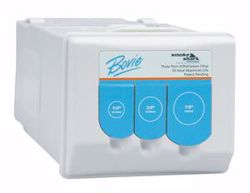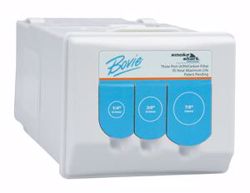You have no items in your shopping cart.
Electrosurgery
MEDTRONIC AUTOSONIX™ ULTRASONIC COAGULATION SYSTEM Ultrashears™ Long, Single-Use Instrument, 5Mm Dia, 38Cm Length, 3/Bx (Continental US Only)
A system of electromechanical components designed to ultrasonically transect and coagulate a broad range of soft tissue. The system includes a generator that produces a 55.5 kHz electrical signal and feeds that signal via the patient cable to a piezoelectric crystal stack mounted in the autoclavable transducer. The crystal stack converts the electrical signal to mechanical vibration at that same frequency. This ultrasonic vibration is amplified as it traverses the length of the titanium probe within the disposable instrument to levels which will permit tissue ablation, cauterization or cutting. Uses ultrasound, or sound waves, for fragmentation of soft tissues. Unlike standard cutting or electrosurgical systems, this system offers precise control of tissue ablation due to the controlled ultrasonic field generated. This precise control allows the surgeon to perform atraumatic transection and coagulation with minimal disturbance to surrounding tissue structure. The generator unit (power supply) feeds a 55.5 kHz (55,500 cycles per second ) electrical signal to piezoelectric crystals mounted in the transducer. The active elements of the transducer then vibrate at that same 55.5 kHz frequency. When placed in a liquid, the vibrating ball tip causes microscopic bubbles to grow and then collapse with great energy intensity, thus causing the tissue directly in front of the probe to be liquefied or fragmented. The blade tip allows cutting and coagulation of tissue by causing shear forces to be developed in the tissue. These shearing forces separate tissue and heat the surrounding tissue to a level which permits coagulation and sealing of blood vessels, without the burning associated with electrocautery.
$1,484.99
MEDTRONIC AUTOSONIX™ ULTRASONIC COAGULATION SYSTEM Ultrashears™ Short, Single-Use Instrument, 5Mm Dia, 15.7Cm Length, 3/Bx (Continental US Only)
A system of electromechanical components designed to ultrasonically transect and coagulate a broad range of soft tissue. The system includes a generator that produces a 55.5 kHz electrical signal and feeds that signal via the patient cable to a piezoelectric crystal stack mounted in the autoclavable transducer. The crystal stack converts the electrical signal to mechanical vibration at that same frequency. This ultrasonic vibration is amplified as it traverses the length of the titanium probe within the disposable instrument to levels which will permit tissue ablation, cauterization or cutting. Uses ultrasound, or sound waves, for fragmentation of soft tissues. Unlike standard cutting or electrosurgical systems, this system offers precise control of tissue ablation due to the controlled ultrasonic field generated. This precise control allows the surgeon to perform atraumatic transection and coagulation with minimal disturbance to surrounding tissue structure. The generator unit (power supply) feeds a 55.5 kHz (55,500 cycles per second ) electrical signal to piezoelectric crystals mounted in the transducer. The active elements of the transducer then vibrate at that same 55.5 kHz frequency. When placed in a liquid, the vibrating ball tip causes microscopic bubbles to grow and then collapse with great energy intensity, thus causing the tissue directly in front of the probe to be liquefied or fragmented. The blade tip allows cutting and coagulation of tissue by causing shear forces to be developed in the tissue. These shearing forces separate tissue and heat the surrounding tissue to a level which permits coagulation and sealing of blood vessels, without the burning associated with electrocautery.
$1,493.99
SYMMETRY SURGICAL SMOKE SHARK™ II SMOKE EVACUATOR Smoke Evacuator Unit With 35-Hour Filter, 100-120V
A light-weight, ultra-quiet and compact design allowing for simplified operation and storage. The Smoke Shark II minimizing exposure to smoke plume during electrosurgical procedure increasing facility safety and reducing hazardous risk. Covered 3-port, 4-phase, filter design provides versatile accessory and procedure setup while decreasing risk of cross contamination. The Smoke Shark II Smoke Evacuator includes a standard two year manufacturer warranty.
$2,121.99
SYMMETRY SURGICAL SMOKE SHARK™ II SMOKE EVACUATOR Smoke Evacuator Unit With 35-Hour Filter, 220-240V
A light-weight, ultra-quiet and compact design allowing for simplified operation and storage. The Smoke Shark II minimizing exposure to smoke plume during electrosurgical procedure increasing facility safety and reducing hazardous risk. Covered 3-port, 4-phase, filter design provides versatile accessory and procedure setup while decreasing risk of cross contamination. The Smoke Shark II Smoke Evacuator includes a standard two year manufacturer warranty.
$2,277.99
MEDTRONIC AUTOSONIX™ ULTRASONIC COAGULATION SYSTEM Autosonix™ Transducer - 2 Pack, 1/Bx (Continental US Only) (DROP SHIP ONLY)
A system of electromechanical components designed to ultrasonically transect and coagulate a broad range of soft tissue. The system includes a generator that produces a 55.5 kHz electrical signal and feeds that signal via the patient cable to a piezoelectric crystal stack mounted in the autoclavable transducer. The crystal stack converts the electrical signal to mechanical vibration at that same frequency. This ultrasonic vibration is amplified as it traverses the length of the titanium probe within the disposable instrument to levels which will permit tissue ablation, cauterization or cutting. Uses ultrasound, or sound waves, for fragmentation of soft tissues. Unlike standard cutting or electrosurgical systems, this system offers precise control of tissue ablation due to the controlled ultrasonic field generated. This precise control allows the surgeon to perform atraumatic transection and coagulation with minimal disturbance to surrounding tissue structure. The generator unit (power supply) feeds a 55.5 kHz (55,500 cycles per second ) electrical signal to piezoelectric crystals mounted in the transducer. The active elements of the transducer then vibrate at that same 55.5 kHz frequency. When placed in a liquid, the vibrating ball tip causes microscopic bubbles to grow and then collapse with great energy intensity, thus causing the tissue directly in front of the probe to be liquefied or fragmented. The blade tip allows cutting and coagulation of tissue by causing shear forces to be developed in the tissue. These shearing forces separate tissue and heat the surrounding tissue to a level which permits coagulation and sealing of blood vessels, without the burning associated with electrocautery.
$3,534.99
SYMMETRY SURGICAL AARON ICON GI ELECTROSURGICAL GENERATOR Icon GI Electrosurgical Generator
An innovative electrosurgical generator with fully digital implementation for use in today's modern GI suites. It was designed in conjunction with GI clinicians to provide a safe, user-friendly unit that can meet all GI procedure demands.
$9,074.99




